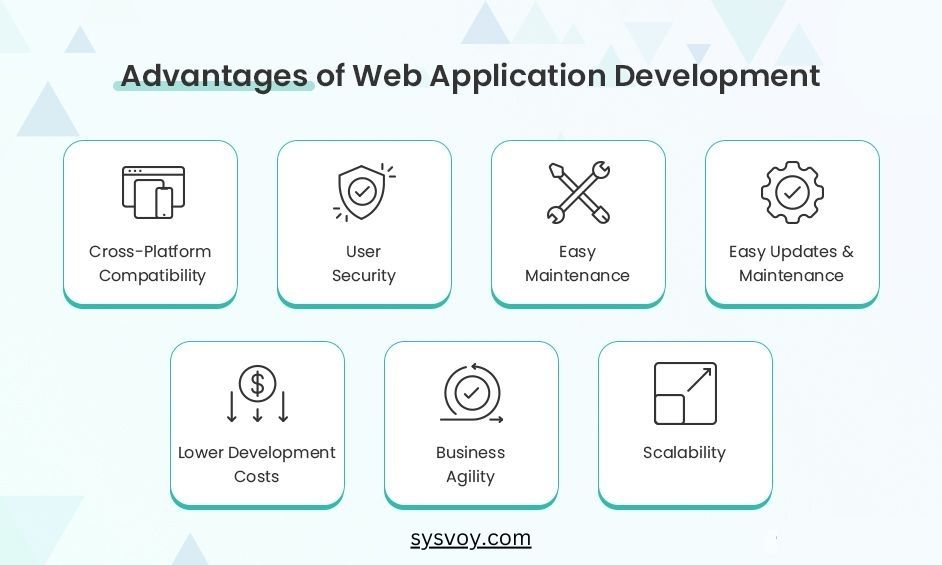Web applications are pivotal for business growth, efficiency, and user experience. This guide explores their significance as revenue drivers and business differentiators, essential for CEOs and business owners aiming to thrive in the digital landscape. Let’s innovate together and shape the future of your business!
Nowadays, a robust web presence is essential to remain competitive amongst competitors. Whether you are a startup or an established enterprise, understanding web application development is crucial for driving growth and innovation.
This blog is your roadmap to navigating the complex world of web development with ease. We’ll provide practical insights into building custom web applications that align with your business objectives. From enhancing customer engagement to streamlining internal processes, we’ll show you how web applications can revolutionize your operations and drive revenue.
This research-driven article – a guide for web application development is your blueprint. We’ll explore what a web application is, its types, how it works, web app development cost, and how to develop a web app. Moreover, we will also talk about what the future of web apps holds.
And most importantly, we’ll equip you with enough information to help you understand everything about web applications.
What is Web Application Development?
Web application development refers to the process of designing, building, testing, and deploying dynamic applications accessed through web browsers over the internet. These web-based applications are installed on remote servers that execute using client-side and server-side programming.
Web app development involves designing and building web-based applications that users can interact with via a web browser (Google Chrome, Mozilla, Firefox, Microsoft Edge, etc), without installing them on their devices. It encompasses various technologies such as HTML, CSS, JavaScript, and backend frameworks like Node.js or Django. By choosing the best web app architecture, developers work on both client-side and server-side components to deliver seamless functionality, usability and scalability to end users. These applications can range from simple websites to complex web-based software solutions, catering to diverse needs across industries and user demographics.
What is a Web Application?
Here, the user enters data through the client-side (front-end), while the server-side (back-end) of the application stores and processes the information.
A few examples of web applications are LinkedIn, MailChimp, or Facebook, which have web apps that provide tailored experiences like native apps directly from web browsers. That’s the reason almost all industries like eCommerce, Education, Healthcare, Finance, and Travel are on the verge of adopting web development with the rise of its popularity.
If you look at the data and statistics about the growth of web applications, you will get a better understanding of why it has created hype amongst all industries.
- As per Statista, revenue in the web application development market is projected to reach US$179.90bn in 2024.
- Modern technologies and JavaScript frameworks like React, Vue, and Angular are gaining popularity in developing Progressive Web Apps (PWAs) and responsive design for web applications.
- The global progressive web apps market is forecasted to reach $10.44 billion by 2027.
- Over 50% of users uninstall some mobile applications because they are not in use and take a lot of space.
When talking about a web application, many people misunderstand it as a website. Since you are here for web app development, you should understand the difference between a web application and a website.
In fact, we will clear your doubts regarding web apps vs websites in the below section.
Most Common Comparisons with Web Application Development
Comparing web apps in today’s era is slightly different from what it was in the past. With the ever-changing world, more and more developers are creating different web applications that are faster, more responsive, and with better graphics.
Keeping up with these changes can be hard for one person to do on their own, but fortunately for you, we have created this list of comparisons to help you out!
Here are some of the most popular comparisons of web apps with websites and mobile apps:
1. Web Application vs Website
Websites are essentially the visualization of images, videos, and written information that can only be seen with severe restrictions on changes from the user side, in contrast to web applications that provide more interaction flexibility to the user.
Let’s read how a website is different from a web application.
| Website | Web Application |
| A website is a collection of web pages and related content that is identified by common domain name and published on at least one web server. | The web application is an application program stored on a remote server and delivered over the Internet through a browser interface. |
| A website is used for communication purposes. | A web application is used for automating tasks to achieve certain goals. |
| A website provides content and information. | A web app offers dynamic functionality and user interaction. |
| A website allows data visualization (reading and comprehending). | A web application permits data manipulation. |
| A website is less resource-intensive and needs less processing power. | A web application is more resource -intensive and needs more processing power. |
2. Web Application vs Mobile Application
You now have a basic understanding of web applications. In what ways do these applications compare to mobile apps? There are certain parallels, such as the fact that both are accessible via cell phones, interactive, and able to store data. However, there are also differences. Let’s read that together.
| Mobile Application | Web Application |
| Mobile applications are developed for specific mobile platforms. | Web apps are accessible across various devices and platforms. |
| Mobile applications require installation from app stores – (iOS or Android). | Web applications are accessible from web browsers, such as Google Chrome, Mozilla Firefox, or Safari, without installation. |
| Mobile apps may offer offline functionality. | Web apps typically require an internet connection. |
| Mobile apps are generally faster and have smoother performance. | The web app’s performance may vary based on the internet connection. |
| Updates require app store approval. | Updates are immediate and do not require approval. |
Benefits of Web Application Development
As a business owner or founder, you might not be fascinated by the web application information we shared earlier. You must be thinking about why we would develop a web application. What types of advantages does web app development bring to us or our users?

To help you understand this, we have outlined some of the best benefits of web-based application development.
- Cross-Platform Compatibility:
It allows a web app like single-page application (SPA) to be used by people regardless of their devices, and this is exactly why many large companies choose to use it, especially if they are targeting a mass audience. - User Security:
Another benefit is that web apps improve user security as no malware can access them as long as the users stick to reliable app store websites (Google Play Store for Android apps and Apple App Store for iOS apps). - Easy Maintenance:
Another benefit of developing a web app is that it is very easy to maintain, provided you have hired professional developers who know what they are doing. - Easy Updates and Maintenance:
Updates to web applications are instant and seamless, as they are deployed centrally on the web server. This ensures all users can access the latest version without requiring manual updates. - Lower Development Costs:
Web application development offers cost and time savings compared to native apps or desktop programs. This is because there’s no need to learn any framework or create local installation packages. Additionally, web app development typically involves less customization due to the availability of frameworks and tools. Moreover, many developers are embracing low-code platforms and tools to speed up the development process. - Business Agility:
The foremost benefit of web app development is that web apps can help your business overcome the obstacles of maintaining a stable product without being able to launch it on various platforms. - Scalability:
Web applications can easily scale to accommodate growing user bases and increased workload demands, making them suitable for businesses of all sizes.
These are a few benefits that, as a business, you can get from web application development. But there’s something more to it; if you want a customized app with complex functionalities to meet your business requirements, then enterprise application development falls into the picture! Designing such applications for large enterprises tailored to their detailed business requirements is known as enterprise app development.



